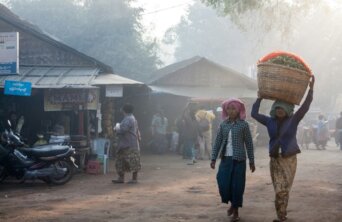- About
- Topics
- Picks
- Audio
- Story
- In-Depth
- Opinion
- News
- Donate
- Signup for our newsletterOur Editors' Best Picks.Send
Read, Debate: Engage.
| topic: | Political violence |
|---|---|
| located: | Myanmar |
| editor: | Lital Khaikin |
Offshore oil and gas development off the coast of Myanmar’s Rakhine State remains caught in the armed conflict between the military junta and opposition forces this spring.
The junta’s approval last fall of the development of a contested mega-project on the China-Myanmar Economic Corridor shows that impoverished Rakhine residents have little agency in their future.
Over the past month, the Chinese-supported Arakan Army has reported victories throughout Rakhine, including Ramree Island. The area is a strategic point with offshore oil and gas infrastructure, major pipelines to Thailand and China’s Yunnan province, and gas-powered plants.
While towns across Rakhine have been hotly contested over the past months between the junta’s Tatmadaw forces and the Arakan Army, private Chinese interests serve both. The state is a strategic point connecting mining projects in Yunnan province with access to the Indian Ocean and further shipping between Africa.
The ruling junta approved the development of the Kyaukpyu Special Economic Zone (SEZ), which is majority-owned by Chinese stakeholders, while the Myanmar government owns only 30 per cent.
Already traced by the paths of oil tankers, Rakhine’s shores will see SEZ terminals on both Ramree Island and Maday Island. With a growing risk of potential oil spills threatening this edge of the Indian Ocean amid the development of the country’s “blue economy”, Myanmar’s regulation on marine pollution still lags in environmental risk assessment, accountability, and emergency response.
Despite special economic zones being newly billed as “green SEZ initiatives”, these highly concentrated industrial zones contribute to pollution, health risks, and higher carbon emissions from their supply chains and transportation infrastructure.
Fishers in Rakhine have decried the impacts of the Kyaukpyu mega-project on their livelihoods. Industrial development has displaced them from villages, forcing them to relinquish their fisheries. They have also called out corruption in the state’s Arakan National Party (ANP) for unconstitutionally supporting the development of the port and increasing oil and gas extraction and export.
Despite the Shwe gas field being one of the largest deposits in Southeast Asia, 80 per cent of Rakhine’s residents live in poverty. And while the state’s oil and gas exports serve Myanmar’s clientelist networks, local communities have to contend with inconsistent delivery of electricity. As SEZ development unfolds, three gas-powered plants have stopped operations in the Kyaukpyu Township over the last two years, leaving some residents and businesses without power.
Whether Myanmar is beholden to corporate stakeholders from NATO states or ASEAN financiers, unchecked fossil fuel extraction and the development of the Kyaupyu Special Economic Zone threaten irreversible damage to the Andaman Sea and Rakhine’s coastal ecologies.
Image by Ajay Karpur.

